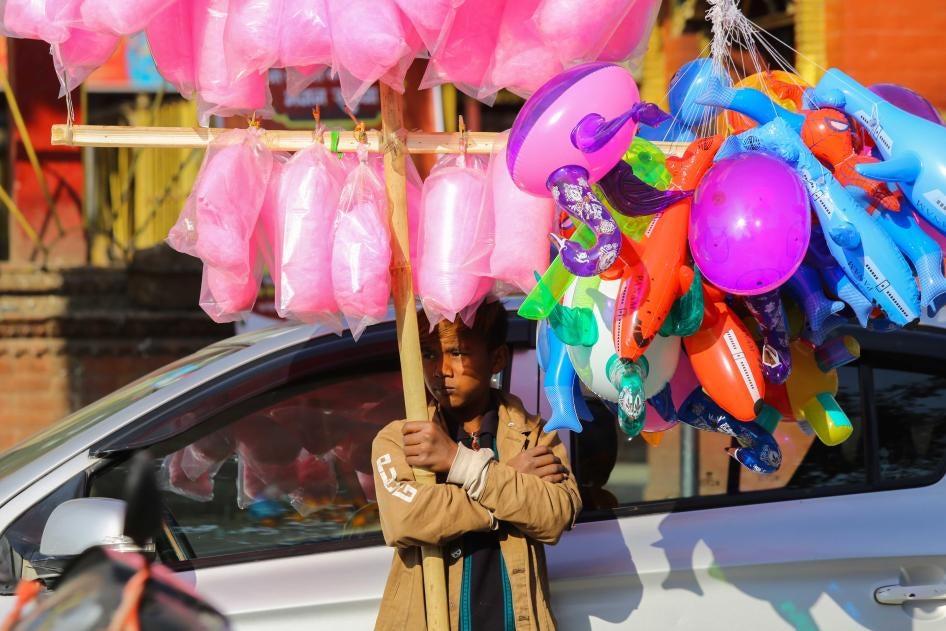(New York) – The policies of the Kathmandu Municipal Government toward street vendors, landless people, and begging are threatening the human rights of thousands of city residents, Human Rights Watch said today. They include the rights to work, to housing, and to an adequate standard of living.
Recent campaigns by the city administration under Mayor Balendra Shah, who was elected in May 2022, have used the municipal police to mistreat the urban poor, including from vulnerable Dalit and Indigenous communities, without measures to provide alternative livelihoods or housing.
“Being poor is not a crime, and taking a punitive approach to street vendors and landless people violates their rights,” said Meenakshi Ganguly, South Asia director at Human Rights Watch. “The authorities have a responsibility to promote livelihoods and ensure suitable housing for everyone, but instead are driving people to destitution by failing to offer safe working conditions and proper resettlement opportunities.”
According to 2018 figures from Nepal’s Central Bureau of Statistics, Nepal has over 34,000 “street businesses,” which provide income to over 45,000 people, many of them living in poverty in the capital, Kathmandu. Since July, the city authorities have deployed municipal police officers to seize their property, placing them at risk of destitution. The city is also home to thousands of landless people who built homes over the years at the side of the Bagmati river, which the authorities intend to demolish without providing other places to live.
In November, Kathmandu municipality announced plans to bulldoze an illegal settlement on the north bank of the Bagmati river, which has been occupied by landless people for over a decade, leading to clashes between residents and the police on November 28.
The authorities claim the evictions are necessary to enforce the rule of law, removing structures that encroach on public land. However, according to the National Land Commission, a statutory body, the city government has failed to provide an alternative place to live. Under international human rights law, everyone has the right to the opportunity to work and to an adequate standard of living, including food, clothing, and shelter.
On December 2, the National Land Commission called on local governments – including that of Kathmandu – to prevent action which may make landless squatters unsafe until it has completed a process of registering them and making alternative provisions. Attempts by authorities in the past to remove the settlement by the Bagmati in Kathmandu caused hardship to residents, who continued to live there even after their homes were destroyed.
In July, the Kathmandu authorities began a campaign against street vendors, accusing them of blocking sidewalks and obstructing pedestrian pathways. The campaign did not include provisions for alternative income and livelihoods for these vendors. Numerous videos on social media show officials chasing street vendors and confiscating their wares, which vendors have said are not returned to them, causing economic hardship. For those who are unable to find regular employment, selling goods on the street is a last resort, enabling the vendors to provide for their families.
A large number of women who have no alternative source of income support themselves and their children by working in the sector. Children also sell items on the streets and in public squares to support themselves and their families. Most people, including most families with young children, do not have access to social protection programs that would help them meet their daily needs.
A 14-year-old girl who sells balloons in a public place to help pay for her and her brother’s education told Human Rights Watch in July that the police frequently chase her, causing her balloons to burst and her family to lose money, and that they have fallen behind with school fees. Vendors have accused officials of soliciting bribes and mistreating children during these raids. The vendors, who have organized a trade-union-affiliated protest movement to defend their industry, say they would support municipal efforts to improve the city’s streets, but that suitable alternative places should be provided where they can trade.
Previous attempts by the authorities to discourage street selling have caused distress to vendors but failed to effect lasting change.
In another draconian policy, the city government announced in July that beggars would be removed from the streets, and placed in a homeless shelter, where there were allegations of abuse in 2019.
All levels of government, including federal, provincial, and municipal authorities, have a duty to support and provide for all residents, protecting their human rights, Human Rights Watch said. To help protect children from poverty and child labor, Nepal should follow through on plans to expand the Child Grant program, which makes social protection payments to families with young children but is not currently available nationwide. The Kathmandu municipality should recognize and incorporate street vendors’ livelihood activities in its urban planning and management.
According to government statistics, half of all businesses in the country are in the informal sector, and they employ 74 per cent of workers. People working in the informal sector, and living in urban poverty, require policies that address their needs, support their rights, and uphold their dignity.
“These are challenging issues faced by many cities around the world, which cannot be solved with abusive crackdowns,” Ganguly said. “Time and again the Kathmandu authorities have caused misery to people who have the least with harsh campaigns that do not address the underlying issues.”









